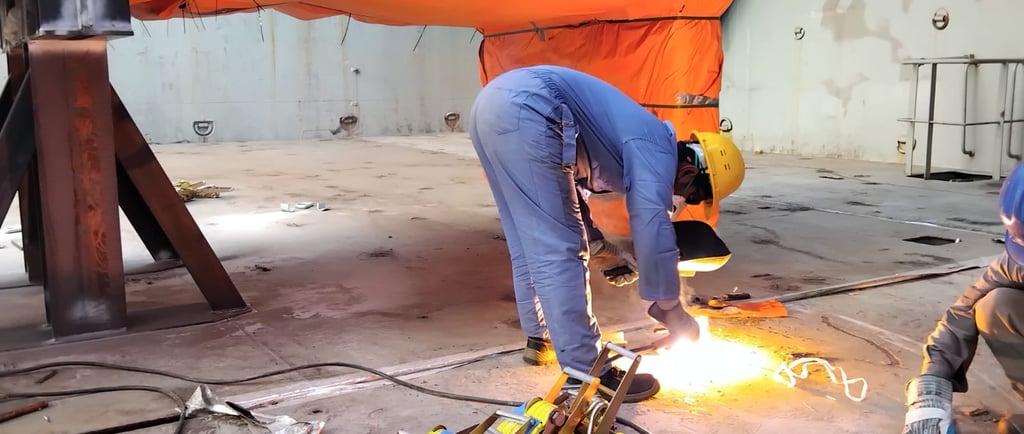Cargo Securing with Welding: The Ultimate Solution for Maritime Stability
How can welding improve your cargo stability while on sea?
12/19/20242 min read


In the dynamic and often unpredictable environment of maritime transport, ensuring the security of cargo is a top priority. The challenges posed by rough seas, shifting loads, and prolonged voyages make it essential to adopt robust and reliable securing methods. Among the various options available, welding stands out as a superior solution, offering unmatched durability and stability.
Why Choose Welding for Cargo Securing?
Unparalleled Strength and Durability
Welding creates a permanent bond between metal components, ensuring the cargo remains securely fastened regardless of external forces. Unlike temporary solutions like straps or clamps, welded connections provide long-lasting strength that can withstand the most severe maritime conditions.Customizable and Versatile
One of the key advantages of welding is its adaptability. Whether securing standard shipping containers, oversized machinery, or irregularly shaped equipment, welding can be tailored to suit the specific requirements of the cargo. This versatility ensures that even the most challenging loads are safely secured.Enhanced Safety
Loose or shifting cargo poses significant risks, not only to the goods themselves but also to the vessel and crew. Welding minimizes these risks by creating a secure framework that holds cargo firmly in place, reducing the likelihood of accidents or damage during transit.Compliance with Industry Standards
Maritime regulations demand high safety standards for cargo securing, and welding meets or exceeds these requirements. By using welded securing systems, shipping operators can ensure compliance with international guidelines while maintaining the integrity of their shipments.Cost-Effectiveness Over Time
While the initial investment in welding may be higher than other securing methods, its long-term benefits far outweigh the costs. The durability of welded connections reduces the need for frequent repairs or replacements, making it a cost-effective choice for repeated shipments.
The Welding Advantage in Action
Imagine transporting heavy industrial equipment across turbulent seas. Straps and belts may loosen or fail under pressure, leading to potential damage or loss. However, a welded securing system ensures the equipment remains firmly anchored, providing peace of mind for both shippers and recipients.
In addition, welding is particularly effective for securing cargo in open-deck environments, where exposure to harsh weather conditions can compromise other securing methods. With welded connections, cargo remains unaffected by rain, wind, or salt spray, ensuring it arrives at its destination in perfect condition.
Trust the Experts
Implementing welding for cargo securing requires skilled professionals who understand the unique challenges of maritime transport. At ASSI, our team of experienced welders is equipped with the expertise and tools to deliver reliable securing solutions tailored to your needs.
Conclusion
Cargo securing with welding is more than just a method—it's a commitment to safety, reliability, and efficiency in maritime shipping. By choosing welding, you’re investing in the security of your cargo, the safety of your crew, and the success of your operations.
Explore the benefits of welding for cargo securing and discover how this tried-and-true method can elevate your shipping standards. Let us help you keep your cargo safe, no matter the journey ahead.
Al Safina Supplies and Investment
Contact US
+968 9803 0880 (Call)
+968 9717 5515 (Whatsapp)
operations@assimena.com
© 2025. All rights reserved.
